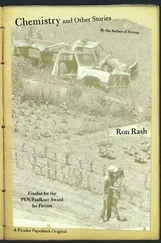Galloway took the wad of tobacco from his mouth and examined it a moment, threw it toward the mountain laurel. Pemberton squeezed his eyes shut. Words came harder now, the smooth glide of thought from brain to tongue ruptured. He formed a sentence and held it in his mind a few moments so it might clarify.
"Why'd he tell you about me helping him?"
"I'm of a mind he figured it'd be a way of getting at least one of you killed," Galloway said. "I reckon he was right about that."
Pemberton did not speak for a few moments. He thought of the child in the sheriff 's office and tried to recall something besides the intense brown eyes. He remembered the child's hair. It hadn't been blonde but dark like his own.
"So the child's safe."
"Mama says he is, him and the Harmon girl both, but that's all Mama can tell me. They's got so far away she can't get them in her mind no more. That trail's went colder than a well digger's ass."
Galloway paused and his countenance appeared almost wistful. He raised his nub and brushed a bead of sweat from his forehead. Galloway stepped closer and kneeled next to Pemberton. He took the hawkbill knife from his pocket and freed the blade with the same slow deliberateness he might undo a bow. The blade clicked as it locked into place.
"Your missus said she didn't want you suffering any more than you had to," Galloway said, "but I can't kill you quick after the way I done the sheriff. It'd lay too heavy on my conscience."
The hawkbill slashed down, cutting open Pemberton's front pant pocket and freeing the twenty-dollar gold piece. Galloway picked up the coin.
"I will take this though," he said, placing it in his pocket. "I figured I earned it."
"Is there a panther?" Pemberton asked.
"You'll know the truth of that in a few hours," Galloway said, and nodded toward the park. "That cat will come across the ridge there and to the left of that cliff hang. It'll smell your blood and soon enough come on down and have a visit."
Galloway lifted the tote sack and swung it over his shoulder. He headed across the meadow, moving in the same shambling manner as before. I'll remember that slow saunter, Pemberton told himself, I'll remember it the very moment I kill him. Galloway stopped and turned.
"One other thing she wanted me to tell you. Your coffin, she said to tell you she's going to order it special from Birmingham. Your missus said she owed you that."
In a few minutes Galloway entered the woods. Pemberton caught glimpses of him through the trees and then a short while later as Galloway followed the trail over the rise. Then he was gone.
Pemberton reached for the gold chain on his pocket watch. He tugged until the watch emerged. When the gold shell opened, two half-moons of glass fell to the ground, but the watch still worked. The hands were on the three and six. Pemberton followed the almost imperceptible drag of the minute hand moving across the watch face toward the seven. He watched the minute hand as intently as possible, thinking if he could see time pass it would somehow make a difference.
But the pain was too much to concentrate more than a few seconds. His whole leg was now swollen, the pain constant all the way to the hip. The leg muscles began to spasm, as if the limb were frantically trying to shake out the venom. Pemberton's stomach heaved and he was glad since that might expel some of the poison, but when he looked at the ground he saw what had come forth was blood. His ribs and ankle hurt as well, but they were afterthoughts, as was his thirst. He'd have to wait the poison out a few hours, let it ease enough to limp out of the gorge.
Pemberton turned so he could face west. He tried to think of something besides the pain. He studied the Smokies as they unfolded into Tennessee. How many millions of board feet of timber were in those mountains, Pemberton wondered. The nausea returned, and more blood brightened the ground when he vomited. His mouth tasted of copper, and he thought of veins of copper and stream beds of jewels inside the Smokies. He thought especially of Cade's Cove, where old-growth yellow poplars yet remained. The tune the workers sang about the big rock candy mountain came into his head and lingered a few moments before dissipating.
Pemberton passed out, and when the pain woke him the day waned. The sun leaned its shoulder into the ridge, and shadows sortied out from the woods into the meadow. Pemberton could smell the leg, its skin now fiery red from kneecap to toes. The limb was dying, would soon enough be black and festering. Pemberton knew he'd lose it, but that would be all right. He could spend his working day on horseback, as Serena did.
His vision blurred and each breath came harder. Pemberton decided he had to start making his way across the meadow. He'd get as far up the trail as he could before full dark and then rest until dawn. They'd crossed a creek halfway down. He'd drink enough water there to get him the rest of the way.
Pemberton pressed both hands to the earth and dragged himself forward a few feet. The broken ankle announced itself anew, and he had to lay his head against the earth a minute. He tried to move again, and when he did the world gave way beneath him, as if trying to pull away. Pemberton clutched a hank of broom sedge and held tight. He remembered the afternoon he'd followed McDowell's police car out to the Deep Creek turnoff. How he'd sat there in the Packard with his hand on the hard rubber ball, and how, for a few moments, it had been like having the world in his grasp.
In half an hour, Pemberton was in the meadow's center. He rested and tried to gain up some strength. It was the only way, he told himself, not so much to survive as prove to Serena he was strong enough after all, worthy of her. If he could just make it back to camp, then everything could be again as it once was.
Shadows fell over him. The festering leg was like dragging a log, and Pemberton imagined the leg gone, how unburdened and free he'd be. If I had the knife I'd cut it off right now, Pemberton told himself, leave it and go on my way. Pemberton retched, but nothing rose into his throat. The world shuddered, tried again to tear free. He grabbed another fistful of broom sedge and held on.
When he regained consciousness, it was twilight. A cry like that of an infant came from the meadow's edge. Jacob, he thought, still safe, still alive. Pemberton raised his head toward the sound, but his vision had receded into some part of himself so deep no light could enter. A few minutes later he heard something brushing the broom sedge, moving resolutely toward him, and Pemberton suddenly knew, knew more surely than he'd ever known anything, that Serena had come for him. He remembered the evening in Boston when Mrs. Lowell had introduced them, and Serena had smiled and reached out her hand to take his. A new beginning, now as well as then. Pemberton could not see or speak, but he opened his hand and let go of the broom sedge, let go of the earth itself as he waited to feel Serena's firm calloused hand embrace his.
In the spring of 1975, an article appeared in Life magazine about Serena Pemberton, describing her long career as a timber baroness in Brazil. Because of her age, the article had an elegiac tone, which the subject did not altogether discourage. She even volunteered that her lawyer had already been given specific plans for her burial (no funeral was mentioned), including internment in a lead coffin built in Birmingham, Alabama. Because it won't rot or rust, Mrs. Pemberton had answered when asked to explain such a choice.
When the reporter wondered if there was anything she'd done in her life that she now regretted, Mrs. Pemberton said absolutely not, then turned the conversation to a tract of brazilwood in Pernambuco, which she hoped to purchase with the help of a West German tractor company. The magazine article's photographs were in color and contemporary except for one, a black-and-white picture that hung in the hacienda's living room. A nostalgic indulgence, she told her interviewer, quite out of character, but there it is. The photograph was of a young Serena Pemberton astride a huge white horse, an eagle on her right arm. Standing beside her was a tall powerfully built man. In the background lay a wasteland of stumps and downed limbs whose limits the frame could not encompass. The photograph's one flaw was Serena Pemberton's face, caught in motion and thus blurred to a gray featurelessness.
Читать дальше












